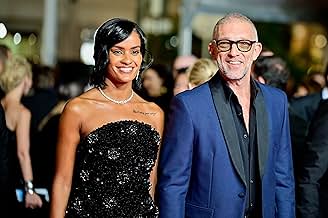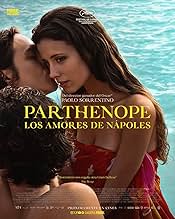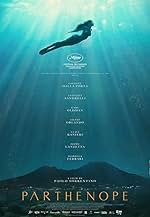Parthenope
- 2024
- Tous publics
- 2h 17min
Naples 1950. Une jeune fille américaine débarque au port après avoir reçu une lettre inattendue.Naples 1950. Une jeune fille américaine débarque au port après avoir reçu une lettre inattendue.Naples 1950. Une jeune fille américaine débarque au port après avoir reçu une lettre inattendue.
- Réalisation
- Scénario
- Casting principal
- Récompenses
- 7 victoires et 25 nominations au total
Antonio Annina
- Raimondo 10 anni
- (as Antonino Annina)
Maria Rosaria Bozzon
- Vecchia megera
- (as Mariarosaria Bozzon)
Résumé
Reviewers say 'Parthenope' by Paolo Sorrentino is visually stunning with breathtaking cinematography and beautiful Naples scenery. It explores themes of beauty, youth, love, and self-discovery. Celeste Dalla Porta's performance is praised for its allure and enigmatic quality. However, the film has mixed reviews, with some finding it pretentious and lacking substance, focusing too much on aesthetics. The narrative structure and character development are contentious, with some appreciating the philosophical approach and others finding it incoherent and shallow.
Avis à la une
Paerthenope isn´t just a film, it is a painting alive: every scene is filmed with such sensibility... If you wonder what real Beauty is, then the film will give you the answer. A real masterpiece in my opinion, that will make you fall in love with the main actress (you can´t escape that !) but also with the beautiful city of Napoli, a city filled with culture and history, the heart of the Italian authenticity. A film that takes you for a walk through essential philosophical questions such as the true essence of Beauty and the ephemeral youth. To put it into a nutshell, I would say Parthenope is a BEAUTIFUL DEPRESSING movie.
May be Parthenope is not the best, but I still think it might be my personal favorite among all of Sorrentino's films.
For me, it is not about history, religion, philosophy, or even family, but simply the story of a young goddess experiencing the beauty, love, desire and sorrow of life-a film that ultimately turns the gaze back to our everyone's own lives. So fragile, so nonsensical, so bizarre, so contradictory, so meaningless-yet still met with both smiles and tears in the face of reality... o forse non è così.
I don't see Parthenope as a "moralized lecture" that offers answers or explanations. On the contrary, it feels like a breathtaking and poetic piece of prose that touches me deeply.
For me, it is not about history, religion, philosophy, or even family, but simply the story of a young goddess experiencing the beauty, love, desire and sorrow of life-a film that ultimately turns the gaze back to our everyone's own lives. So fragile, so nonsensical, so bizarre, so contradictory, so meaningless-yet still met with both smiles and tears in the face of reality... o forse non è così.
I don't see Parthenope as a "moralized lecture" that offers answers or explanations. On the contrary, it feels like a breathtaking and poetic piece of prose that touches me deeply.
Why would you watch this movie? Probably based on what we know that is said about Sorrentino and his perfect eye for the breathtaking visuals. Indeed, with the first shot in the movie he makes it clear - showing a carriage and the "Captain" floating on the sea with the view on the stunning coast of Napoli!
Not its beauty, but the Napoli itself is one of the key topics. If this city could be personified, it will definitely be a beautiful woman. Only, just like a person, Napoli is much more than a beauty and it definitely has its dark places.
It personally touched me that one of the key topics (and a key question) is also (what is) a study of Anthropology. Anthropology, formed of two Latin words, meaning a person and science. No other study could have been better for this movie, rather than a study of the most complicated being in this world. I will save you from spoilers and let you think of what Anthropology is before the movie answers it for you, but keep in mind that it is shown by the biggest "superpowers" of Parthenope and especially in her brother Raimondo, who in my opinion was the one that taught that to Parthenope.
The third matter that made me absolutely passionate about this movie was the precise choice of words and creation of dialogues. Her love interests were mostly people who had the most beautiful way of expressing their emotions. Listing to their dialogues made me feel like I've read a book.
I highly recommend watching this movie, although it may have some bizarre moments that can make you feel uneasy. But if you are open to understanding and accepting the strangeness, it will definitely let you "get carried away."
Not its beauty, but the Napoli itself is one of the key topics. If this city could be personified, it will definitely be a beautiful woman. Only, just like a person, Napoli is much more than a beauty and it definitely has its dark places.
It personally touched me that one of the key topics (and a key question) is also (what is) a study of Anthropology. Anthropology, formed of two Latin words, meaning a person and science. No other study could have been better for this movie, rather than a study of the most complicated being in this world. I will save you from spoilers and let you think of what Anthropology is before the movie answers it for you, but keep in mind that it is shown by the biggest "superpowers" of Parthenope and especially in her brother Raimondo, who in my opinion was the one that taught that to Parthenope.
The third matter that made me absolutely passionate about this movie was the precise choice of words and creation of dialogues. Her love interests were mostly people who had the most beautiful way of expressing their emotions. Listing to their dialogues made me feel like I've read a book.
I highly recommend watching this movie, although it may have some bizarre moments that can make you feel uneasy. But if you are open to understanding and accepting the strangeness, it will definitely let you "get carried away."
Along the lines of the legendary beauty Aphrodite, "Parthenope" (Celeste Dalla Porta) was born in the sea and grew to become a great temptress to both of her male contemporaries. The first being her obsessed brother "Raimondo" (Daniele Rienzo) and the other her adoring childhood friend "Sandrino" (Dario Alta) whose unrequited love for her drove him to distraction. Not, however, to such distraction as that of her sibling, It's when the trio decide to head for an unfunded trip from their home in Naples to the nearby island of Capri that she meets elderly American writer/dipso "Cheever" (Gary Oldman) who finds her intriguing but appears to have a certain immunity to her charms and she's not used to that. Whilst on this carefree trip there befalls a tragic realisation that causes all of them to appreciate the stark realities and fickle shallowness of their lives and brings into focus senses of grief, rejection and emptiness. It's a beautifully photographed piece of cinema, this film, with sparing dialogue and a sexually, but not explicitly so, charged chemistry abundant throughout this rather visually extravagant but disappointingly soulless drama. It is a bit like a postcard upon which is a beautiful picture but just too few words to develop the characters or to quite put enough meat on their perfectly formed bones. Indeed as the second hour starts to drag, the whole thing begins to look more like a repetitively self-indulgent vanity exercise that might be rooted in mythology but that struggles to engage beyond the superficial. It's classy and stylish and well worth a look - but look appears to be all Paolo Sorrentino wants us to do.
I was so close to leaving the cinema half way through this film, but stayed. And the best bits are actually in the 2nd half so Im giving it 6 stars instead of the 4 which the first half deserved. However, I still dont think this is a good movie. Fantastic visually yes, for Sorrentino is a master of unforgettable filmic tableaus, but that just isn't enough.
The overall problem...There is no plot, it's more a series of separate scenes on narcissism, or rather that's how they come across. I think Sorrentino wanted to create something profound but the result feels contrived and sad.
And then there's the anticlimactic ending - a sudden flash forward 50 years to an oddly empty/vacant character that is Parthenope in her 70s. What? Why?
The overall problem...There is no plot, it's more a series of separate scenes on narcissism, or rather that's how they come across. I think Sorrentino wanted to create something profound but the result feels contrived and sad.
And then there's the anticlimactic ending - a sudden flash forward 50 years to an oddly empty/vacant character that is Parthenope in her 70s. What? Why?
Le saviez-vous
- AnecdotesPaolo Sorrentino said he reached out to Gary Oldman about filming a cameo after hearing that Oldman was a huge fan of his. Oldman immediately accepted saying Sorrentino was at the top of his wish list to collaborate with.
- Citations
Devoto Marotta: It's very difficult to see, because it's the last thing you learn.
Parthenope: When do you learn to see?
Devoto Marotta: When everything else begins to be missing.
Parthenope: What is everything else?
Devoto Marotta: Love, youth, desire, emotion, pleasure.
- Bandes originalesWarmth
Written by Peter Gregson
Performed by Peter Gregson, Warren Zielinski, Magdalena Filipczak, Laurie Anderson, Ashok Klouda
Meilleurs choix
Connectez-vous pour évaluer et suivre la liste de favoris afin de recevoir des recommandations personnalisées
- How long is Parthenope?Alimenté par Alexa
Détails
- Date de sortie
- Pays d’origine
- Sites officiels
- Langues
- Aussi connu sous le nom de
- Партенопа
- Lieux de tournage
- Sociétés de production
- Voir plus de crédits d'entreprise sur IMDbPro
Box-office
- Budget
- 26 300 000 € (estimé)
- Montant brut aux États-Unis et au Canada
- 289 303 $US
- Week-end de sortie aux États-Unis et au Canada
- 31 588 $US
- 9 févr. 2025
- Montant brut mondial
- 11 623 475 $US
- Durée
- 2h 17min(137 min)
- Couleur
- Mixage
- Rapport de forme
- 2.39 : 1
Contribuer à cette page
Suggérer une modification ou ajouter du contenu manquant





























